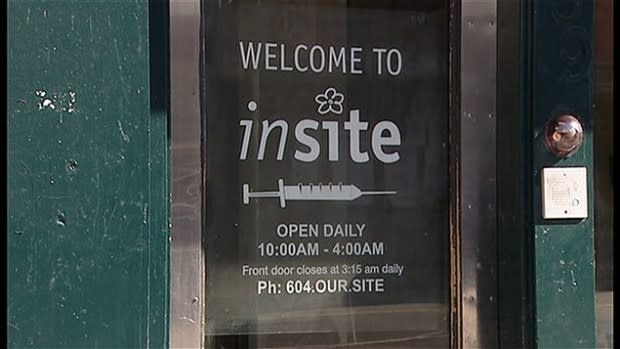Fight for safe supply of drugs is 'this generation's Insite,' advocates say
Two long-time activists see significant similarities between the current fight for a safe supply of drugs and the fight for Insite, Vancouver's — and North America's — first legal supervised consumption site.
In the midst of an opioid epidemic that has claimed the lives of more than 4,500 British Columbians since the beginning of 2016, drug users, frontline workers and medical health professionals say one of the key solutions to the crisis is clear.
They want the government to provide a safe and legal supply of drugs to allow users to avoid the toxic street supply provided by organized crime.
However, both the federal and provincial government have been hesitant to fully commit to the idea.
Ann Livingston, who helped found the Vancouver Area Network of Drug Users (VANDU) and currently works with the B.C./Yukon Association of Drug War Survivors, says this resistance from politicians feels similar to that faced by activists pushing for supervised consumption in the 1990s.
Garth Mullins, a drug user activist and host of the Crackdown podcast, concurs.
"I've often said that safe supply is this generation's Insite," Mullins said.
An idea born from desperation
When comparing the two, the most obvious parallel is that the idea of safe supply, like the idea of safe consumption sites, is born from desperation.
In the early 1990s, deaths from HIV/AIDS and drug overdoses skyrocketed. In 1993, 354 British Columbians died from illicit drugs, an incredible number for the time. That's when the idea for supervised consumption gained traction.
At a dedicated site, drug users could receive medical attention in case of drug poisoning, and reduce the risk of transmitting disease through used needles.

Another similarity, according to Thomas Kerr, a professor at the Univeristy of British Columbia's faculty of medicine and a senior researcher with the British Columbia Centre on Substance Abuse (BCCSU), is that the idea is being pushed by people on the frontlines.
"Like in the case of supervised injection sites, it was initially led by the community of people who use drugs themselves," Kerr said.
"So they are usually a few steps ahead of the bureaucracy and are the ones making the call for this type of measure."
As was the case with Insite, a change to the law would be required for safe supply to be put in place. The federal government would have to amend the Controlled Drugs and Substances Act.
Underground safe supply
Advocates and health professionals say there are plenty of lessons to be learned from the fight for Insite.
Both Mullins and Livingston say civil disobedience is required to achieve a safe supply of legal drugs.
They believe unsanctioned safe injection sites operating in the 1990s and 2000s tipped the scales in the eventual Insite victory. Livingston says she worked at six different illegal sites over the course of 20 years of activism.

They say efforts to establish an underground safe supply of drugs are already underway.
"As far as I know, there are heroin-buying clubs going on right now, which is how you get things — you break the law. You do it in an unsanctioned way," Livingston said.
And while the logistics of operating a user-run heroin-buyers club — which requires a large sum of cash up front, knowledge of the illegal drug market, medical testing equipment and a peer distribution network — are daunting compared to running an off-book safe consumption site, Mullins says the alternative is simply too much to take.
"You see your colleagues overdosing and overdosing and you see people dying," Mullins said.
"At one point, people are just like, 'we just have to do something.'"
Hope for campaign debate
With the federal election just around the corner, there is some hope that the idea of safe supply will be debated on the campaign trail.
But Kerr isn't holding his breath.
"I'm not very optimistic we'll hear a debate about it at the federal level," he said.

"The really unfortunate thing is, I think we're becoming a little bit habituated to the opioid epidemic. And I think people have started to tune out of it and it's sad and shocking if this can become the new normal."
It's that new normal that users, advocates, and frontline workers say can be put to a stop with the implementation of a safe supply policy.
And some of them believe in it so strongly, they're apparently willing to risk arrest and serious jail time to make it happen, just like advocates did for Insite back in the 1990s.


